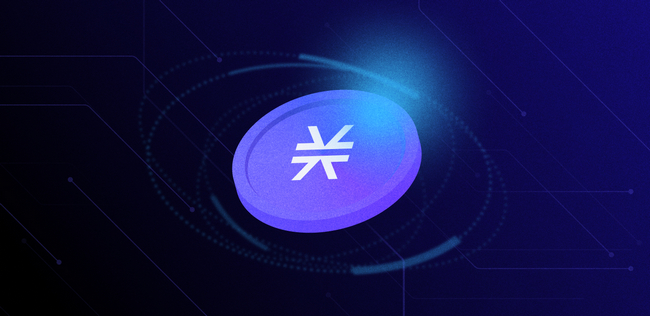-
 Bitcoin
Bitcoin $87,315.1852
3.56% -
 Ethereum
Ethereum $1,630.6745
3.43% -
 Tether USDt
Tether USDt $1.0000
-0.01% -
 XRP
XRP $2.1211
3.50% -
 BNB
BNB $601.3750
1.83% -
 Solana
Solana $139.4069
1.88% -
 USDC
USDC $1.0000
0.00% -
 Dogecoin
Dogecoin $0.1621
5.44% -
 TRON
TRON $0.2427
-1.07% -
 Cardano
Cardano $0.6408
4.12% -
 Chainlink
Chainlink $13.4721
4.10% -
 Avalanche
Avalanche $20.5905
6.44% -
 UNUS SED LEO
UNUS SED LEO $9.0293
-3.55% -
 Stellar
Stellar $0.2580
6.57% -
 Toncoin
Toncoin $3.0124
1.24% -
 Shiba Inu
Shiba Inu $0.0...01262
3.69% -
 Sui
Sui $2.2608
7.36% -
 Hedera
Hedera $0.1701
4.81% -
 Bitcoin Cash
Bitcoin Cash $340.3613
1.98% -
 Polkadot
Polkadot $3.9035
2.19% -
 Litecoin
Litecoin $80.3247
5.82% -
 Hyperliquid
Hyperliquid $17.9745
1.79% -
 Dai
Dai $1.0000
0.00% -
 Bitget Token
Bitget Token $4.4669
1.79% -
 Ethena USDe
Ethena USDe $0.9992
0.00% -
 Pi
Pi $0.6333
1.02% -
 Monero
Monero $215.0155
0.40% -
 Uniswap
Uniswap $5.4281
4.46% -
 Pepe
Pepe $0.0...07881
7.27% -
 Aptos
Aptos $5.1724
4.43%
One article to understand what STX coins are and which country STX coins are from
STX Coins, originating from the US, are a cryptocurrency used to power the Stacks blockchain, a layer-1 solution that brings smart contract functionality to Bitcoin and offers staking, governance, and DeFi applications.
Oct 03, 2024 at 08:59 pm

Understanding STX Coins
1. What are STX Coins?
STX Coins (Stacks Tokens) are a type of cryptocurrency that is used to power the Stacks blockchain. The Stacks blockchain is a layer-1 blockchain that allows developers to build smart contracts and decentralized applications (dApps) on top of Bitcoin (BTC).
2. Purpose of STX Coins
STX coins serve several purposes within the Stacks ecosystem:
- Transaction fees: STX coins are used to pay for transaction fees on the Stacks blockchain.
- Staking: Users can stake their STX coins to earn rewards and participate in the blockchain's security.
- Governance: STX coin holders have the ability to participate in community governance and vote on changes to the Stacks protocol.
3. Country of Origin
The Stacks blockchain was developed by a team based in the United States. STX coins, therefore, originate from the United States.
4. Key Features of STX Coins
- Proof-of-Work Security: The Stacks blockchain utilizes Bitcoin's Proof-of-Work security model, making it highly secure.
- Smart Contract Compatibility: Stacks supports Solidity, the programming language used to build smart contracts on Ethereum.
- Bridge to Bitcoin: The Stacks blockchain is connected to the Bitcoin blockchain, allowing STX coins to be easily converted to and from BTC.
- Value Proposition: STX coins offer the potential for value appreciation as the Stacks ecosystem grows and attracts more users and developers.
5. Applications of STX Coins
STX coins play a vital role in various applications within the Stacks ecosystem, including:
- Decentralized Finance (DeFi): Stacks enables the creation of DeFi applications that provide financial services such as lending, borrowing, and trading.
- Non-Fungible Tokens (NFTs): Stacks allows creators to mint and trade NFTs, representing digital assets that are unique and verifiable.
- Web3 Games: Stacks supports the development of Web3 games that incorporate blockchain elements and allow users to own and control their in-game assets.
Disclaimer:info@kdj.com
The information provided is not trading advice. kdj.com does not assume any responsibility for any investments made based on the information provided in this article. Cryptocurrencies are highly volatile and it is highly recommended that you invest with caution after thorough research!
If you believe that the content used on this website infringes your copyright, please contact us immediately (info@kdj.com) and we will delete it promptly.
- Ethereum (ETH) Attempts a Comeback as Key Resistance Nears
- 2025-04-21 20:00:20
- Bitcoin Did Not Have the Explosive Start Many Expected
- 2025-04-21 20:00:20
- Bitcoin (BTC) Surges to New All-Time Highs as Gold Market Invests Flock to Safe-Haven Assets
- 2025-04-21 19:55:13
- AI Trading Agents Are Disrupting the Financial Services Industry
- 2025-04-21 19:55:13
- 4 Crypto Coins to Watch That Are Rewriting the Rules
- 2025-04-21 19:50:12
- President Donald Trump's threat to terminate Federal Reserve Chairman Jerome Powell
- 2025-04-21 19:50:12
Related knowledge

What is Ethereum’s Slashing mechanism and how to punish malicious behavior?
Feb 20,2025 at 03:08am
Key PointsOverview of slashingDifferent types of slashing in EthereumIncentives and consequences of slashingIdentifying and reporting slashed validatorsOngoing discussions and potential improvementsEthereum's Slashing Mechanism: Punishing Malicious BehaviorEthereum's slashing mechanism is an essential tool for ensuring network security and punishing mal...

What is the verifier node of Ethereum and how to become a verifier?
Feb 19,2025 at 06:00pm
The Verifier Node of Ethereum: A Comprehensive GuideKey Points:What is a Verifier Node?How to Become a Verifier NodeResponsibilities and Rewards of a Verifier NodeMinimum Requirements for Becoming a Verifier NodePotential Difficulties in Running a Verifier Node1. What is a Verifier Node?A Verifier Node is an independent entity on the Ethereum network th...

What is Ethereum’s staking, and how to participate and earn money?
Feb 19,2025 at 04:37pm
Key Points:Understanding Ethereum's Staking MechanismSteps to Participate in StakingBenefits and Rewards of StakingSecurity and Risk ConsiderationsTechnical Requirements and Hardware OptionsPotential Challenges and Troubleshooting TipsFAQs on Ethereum StakingWhat is Ethereum's Staking?Proof-of-Stake (PoS) is a consensus mechanism used in blockchain netw...

What is Ethereum’s DAO (Decentralized Autonomous Organization) and how does it work?
Feb 20,2025 at 03:12am
Key PointsDefinition and Structure of a DAOGovernance and Decision-Making in DAOsBenefits and Use Cases of DAOsChallenges and Limitations of DAOsWhat is Ethereum's DAO (Decentralized Autonomous Organization) and How Does It Work?Definition and Structure of a DAOA Decentralized Autonomous Organization (DAO) is an innovative governance and management fram...

What is Ethereum's multi-signature wallet and how to improve security?
Feb 20,2025 at 02:18pm
Key Points:Understanding the Concept of a Multi-Signature WalletBenefits and Drawbacks of Multisig WalletsRequirements for Setting Up a Multisig WalletStep-by-Step Guide to Generating a Multisig WalletImplementing Strategies for Enhanced Security1. Understanding the Concept of a Multi-Signature WalletA multi-signature (multisig) wallet in the Ethereum e...

What is Ethereum's oracle and how to provide data for smart contracts?
Feb 21,2025 at 01:30am
Key Points:Understanding the concept of oracles in EthereumExploring different types of oraclesDetailed guide on how to provide data for smart contractsAddressing potential challenges and considerationsWhat is Ethereum's Oracle?Oracles are crucial components in the Ethereum ecosystem, enabling smart contracts to access real-world data and off-chain even...

What is Ethereum’s Slashing mechanism and how to punish malicious behavior?
Feb 20,2025 at 03:08am
Key PointsOverview of slashingDifferent types of slashing in EthereumIncentives and consequences of slashingIdentifying and reporting slashed validatorsOngoing discussions and potential improvementsEthereum's Slashing Mechanism: Punishing Malicious BehaviorEthereum's slashing mechanism is an essential tool for ensuring network security and punishing mal...

What is the verifier node of Ethereum and how to become a verifier?
Feb 19,2025 at 06:00pm
The Verifier Node of Ethereum: A Comprehensive GuideKey Points:What is a Verifier Node?How to Become a Verifier NodeResponsibilities and Rewards of a Verifier NodeMinimum Requirements for Becoming a Verifier NodePotential Difficulties in Running a Verifier Node1. What is a Verifier Node?A Verifier Node is an independent entity on the Ethereum network th...

What is Ethereum’s staking, and how to participate and earn money?
Feb 19,2025 at 04:37pm
Key Points:Understanding Ethereum's Staking MechanismSteps to Participate in StakingBenefits and Rewards of StakingSecurity and Risk ConsiderationsTechnical Requirements and Hardware OptionsPotential Challenges and Troubleshooting TipsFAQs on Ethereum StakingWhat is Ethereum's Staking?Proof-of-Stake (PoS) is a consensus mechanism used in blockchain netw...

What is Ethereum’s DAO (Decentralized Autonomous Organization) and how does it work?
Feb 20,2025 at 03:12am
Key PointsDefinition and Structure of a DAOGovernance and Decision-Making in DAOsBenefits and Use Cases of DAOsChallenges and Limitations of DAOsWhat is Ethereum's DAO (Decentralized Autonomous Organization) and How Does It Work?Definition and Structure of a DAOA Decentralized Autonomous Organization (DAO) is an innovative governance and management fram...

What is Ethereum's multi-signature wallet and how to improve security?
Feb 20,2025 at 02:18pm
Key Points:Understanding the Concept of a Multi-Signature WalletBenefits and Drawbacks of Multisig WalletsRequirements for Setting Up a Multisig WalletStep-by-Step Guide to Generating a Multisig WalletImplementing Strategies for Enhanced Security1. Understanding the Concept of a Multi-Signature WalletA multi-signature (multisig) wallet in the Ethereum e...

What is Ethereum's oracle and how to provide data for smart contracts?
Feb 21,2025 at 01:30am
Key Points:Understanding the concept of oracles in EthereumExploring different types of oraclesDetailed guide on how to provide data for smart contractsAddressing potential challenges and considerationsWhat is Ethereum's Oracle?Oracles are crucial components in the Ethereum ecosystem, enabling smart contracts to access real-world data and off-chain even...
See all articles






















































































